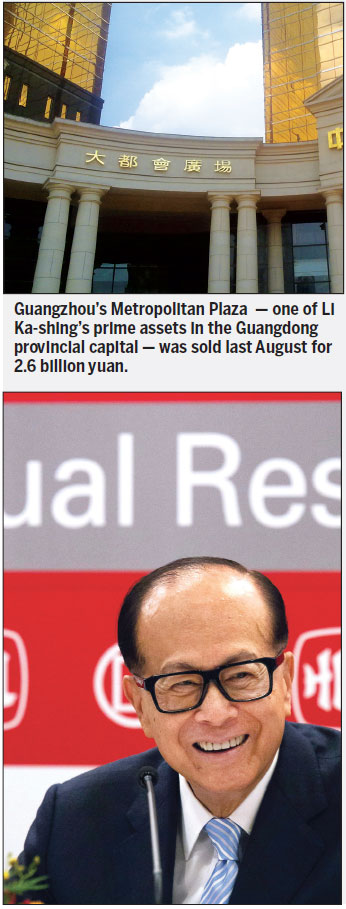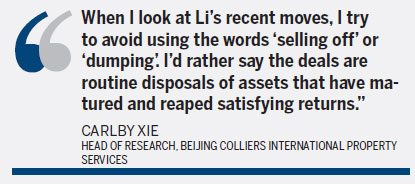It's just another shrewd bet
Updated: 2014-09-17 06:19
By Li Xiang in Beijing(HK Edition)
|
|||||||||

Every time Li Ka-shing makes a move in the property market, be it in Hong Kong, overseas or on the mainland, it unleashes ripples through financial circles, and immediately sets the rumor mills in motion, triggering wild talk or even frenzy as to what's up the sleeve of Hong Kong's "superman".
Whenever he dumps a piece of property or a company under his belt, the guessing game starts - is he turning his back on Hong Kong or the mainland?
But, market watchers argue that the rumor-mongers are usually off the mark - Li is neither abandoning the place nor losing confidence in it. He's just an astute businessman exercising pure business acumen.
Since last year, Li has been pouring cold water on the mainland's real-estate market by selling off prime properties in major cities, including Beijing and Shanghai. The tycoon and his son Richard Li Tzar-kai have reportedly sold assets worth 25 billion yuan ($4.07 billion) in the past year.
The press and some industry experts say Asia's richest man may have turned bearish on China and is moving out of the mainland property market as the golden era may be over.
Some are worried that Li's decision may hold sway over other investors' judgments on market prospects, and could spark sell-offs in the mainland property scene, which has witnessed a downward price trend since the beginning of this year.
Analysts think this may be just a part of the story. What's neglected is that Li's moves could signal changes in his asset allocation and investment strategy. They note that Li may switch to other promising assets, such as projects in second-tier cities instead of completely abandoning the mainland.
Routine asset disposals
"When I look at Li's recent moves, I try to avoid using the words 'selling off' or 'dumping'. I'd rather say the deals are routine disposals of assets that have matured and reaped satisfying returns," said Carlby Xie, head of research at real-estate consultancy Beijing Colliers International Property Services Co Ltd.
"They are good-timing decisions so that he could gain fresh cash flow to invest in other projects, for example, properties and assets in the mainland's secondary cities," Xie said.
Retail properties in second- and third-tier mainland cities remain a good bet although some developers have shifted back to the country's biggest cities due to the economic slowdown, which has made smaller cities less appealing, analysts argued. "The consumption potential in those cities is still something investors can bet on, and it can help balance growth on the supply side," Xie said.
Li's most recent property disposal on the mainland involved Shanghai International Capital Plaza, which was sold by the magnate's ARA Asset Management for 1.54 billion yuan.
Other notable assets he has got rid of include Beijing's Pacific Century Place, Metropolitan Plaza in Guangzhou, Shanghai's Oriental Financial Center and the Nanjing International Financial Center.
Li told the mainland press earlier this year that the disposals were merely "sell-high, buy-low" moves. "Talk of our disinvestment is a big joke," he said.
Zhang Dawei, chief market analyst with Beijing-based Zhongyuan Real Estate, said the sales could be interpreted as Li being bearish on mainland assets, but they shouldn't be over-interpreted as the assets sold account for just a small portion of Li's entire investment portfolio.
"It's natural for any investor to reduce risks when he already has a high asset allocation in one market," Zhang reckoned.
"We estimate that the mainland assets Li had sold made up only about 5 percent of his investment portfolio, which is quite a small portion," he said.
Li's diversification away from mainland properties has also raised questions of who are the investors who have taken over his assets and why they have done it.
In April, Gaw Capital Partners, a private equity fund with an international sovereign wealth investor background, acquired Pacific Century Place in Beijing, owned by Richard Li, for $928 million. "The investors of Gaw Capital have been looking for prime assets in China for a while, and Li's asset happens to fit into their investment mandate," said Xie.
Properties' added value
"They're betting on the added value of the property in a prime location of Beijing, which will create room for greater value after the upgrade under their management," he added.
In another deal in August, mainland real-estate firm Oceanwide Holdings Co Ltd acquired a 72-percent stake in Hutchison Harbour Ring Ltd - a unit of Li's Hutchison Whampoa.
The purchase ignited speculation that it wasn't a smart move by Oceanwide as the acquired company has little future growth potential.
Oceanwide's president Han Xiaosheng explained that his company has been looking for a shell company to get it floated in Hong Kong, and Li's subsidiary company serves the purpose well.
"The transaction is simply a market-driven move," Han was quoted by the mainland media as saying. "Mr Li, perhaps, has a wider scope that extends to international markets, such as Europe, in terms of asset allocation, whereas our company focuses mainly on the domestic real-estate sector," he said.
lixiang@chinadaily.com.cn

(HK Edition 09/17/2014 page9)